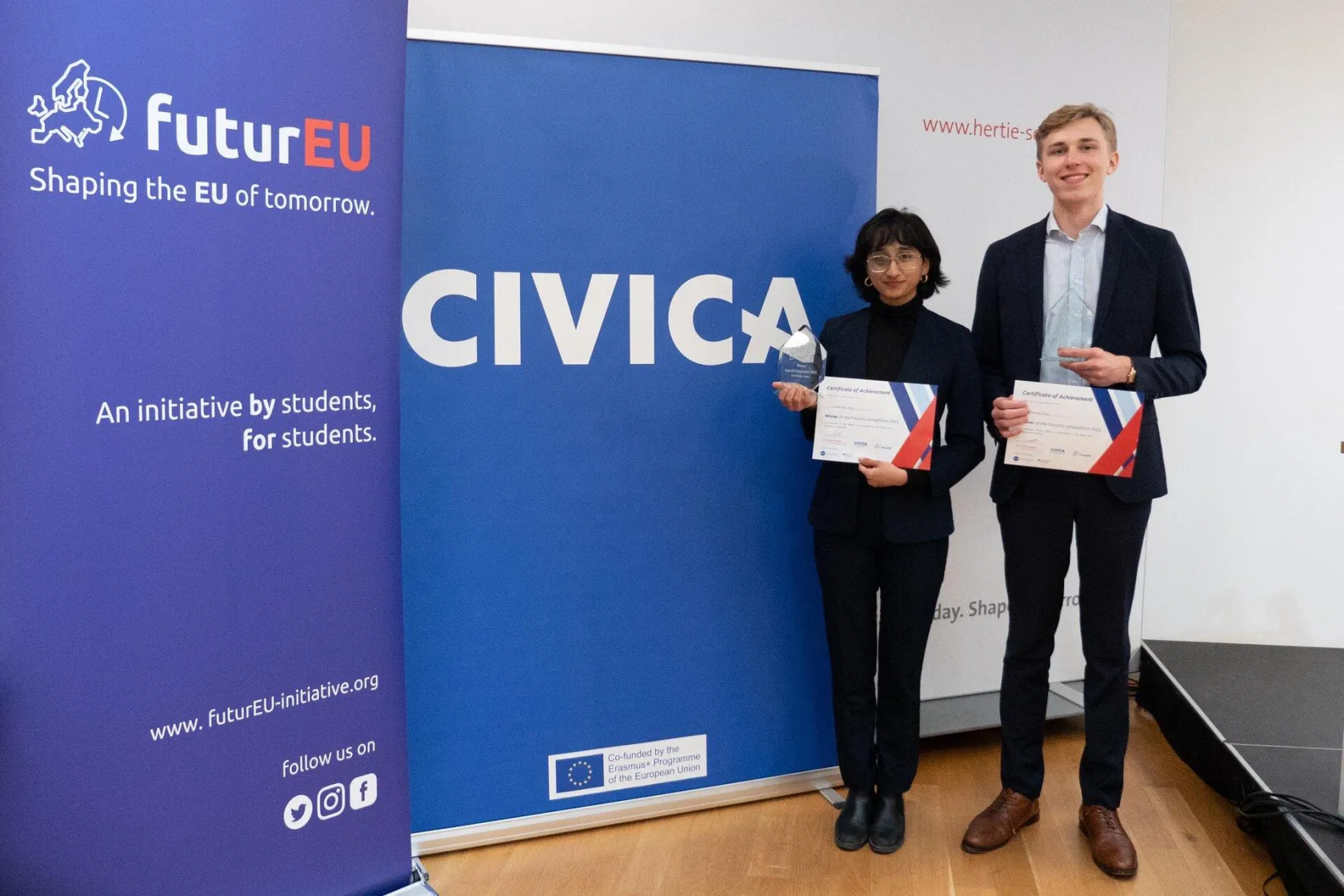
The Climate Divide: futurEU winners address EU's equitable Climate Policy
Eman Atta Maan from Pakistan and François Praum from France formed the Bocconi team that won the futurEU competition 2023 with their policy proposal titled "The Climate Divide: Why the EU's Border Adjustment Mechanism Needs Rethinking for Developing Countries."
The futurEU Initiative was founded in 2019 by master's students of the Hertie School, with the support of the CIVICA alliance, the Jacques Delors Centre Berlin, and the Hertie School. The competition was open to all CIVICA students and PhD researchers and consisted of a written round with a submission of a policy brief. With 104 teams participating, over 260 students and researchers from across all CIVICA partners entered this year's edition with proposals on the topic "Climate Change and Societal Transformation: How Can EU Policy Advance Climate Protection and Sustainability in a Turbulent World?".
In the framework of the CIVICA for Ukraine project, this third edition of the futurEU competition finals included an Observer Track for students from 5 Ukrainian universities. Besides gaining access to all the workshops on skills development offered throughout the competition, 16 Ukrainian students participated as observers of the competition finals at the Hertie School and gave a presentation on the devastating environmental impact of the war in Ukraine to the online and on-site audience.
An interview with the winning team on their proposal and experience follows:
- What is your policy brief about?
François Praum: "Our policy proposal focused on the Carbon Border Adjustment Mechanism (CBAM) of the European Union which is set to enter its transitional phase in October this year. This unique tariff on energy-intensive imports poses a threat to export-dependent developing countries - especially Least Developed Countries (LDCs) and Small Island Developing States (SIDS) - that have minimally contributed to the climate crisis, yet are harshly hit by the latter, and that do not have the capacities to decarbonise without multilateral help. We are convinced that this EU policy is unfair towards developing countries. To solve this issue, we propose a three-pronged approach to make the CBAM equitable and inclusive: First, granting exemptions for LDCs and SIDS; second, emphasising dialogue with them; and third, financing their low-carbon energy transition to accelerate decarbonisation, using all the revenues that the EU will generate with the CBAM to be allocated to climate financing."
- Why is this topic so important for you?
Eman Atta Maan: "Coming from Pakistan, where climate change-induced natural disasters have become all too frequent, I felt strongly that the CBAM was not only unfair toward developing countries, but also tone-deaf to the EU's own complicity in the climate crisis. Now is not the time to impose costs on the victims but to adopt a common (but differentiated) approach to mitigating climate change. I wholeheartedly believe the EU has a major role to play in this, starting from its own policies."
- What pushed you to enter a competition on the future of the EU?
Eman: "To be honest, there were many reasons, but mostly that I wanted to be able to provide my two cents on what policymakers in Brussels decide. It was an incredibly empowering process of being able to pinpoint a policy problem in Europe and decide how to fix it."
François: "As an economics student, participating in the futurEU competition was a great learning opportunity for how to effectively identify a policy problem in the EU's environmental agenda, and how to structure and present our own ideas in front of a selected jury panel of the Jacques Delors Centre. How could we convince the Jury of the problem's urgency? How could our policy proposal be effectively implemented using pre-existing legislative frameworks? Answering these questions throughout the competition taught us valuable lessons on policymaking, which we cannot wait to apply in the future in an institutional context!
- What did you get out of this experience?
Eman: An understanding of what a suspect under interrogation must feel like... jokes aside, I learnt to defend my ideas to the death, even when they were scrutinized under a microscopic lens. It truly gave me an appreciation of the importance of standing by what you believe in.
Francois also mentioned that the spirit amongst participants was an extremely enriching one, and that every group focused on vastly different policy areas and developed diverse proposals. "It was fascinating to see how everyone's creativity to mitigate the climate crisis addressed various types of inequalities and inefficiencies on the current European climate change mitigation agenda. We learned a lot from the other groups, especially the Observer Track, and we all very much hope to stay in touch!"